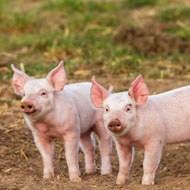ASF will ‘almost certainly’ spread to other Asian countries

To date, nearly 40,000 infected animals have been culled in China, in an attempt to limit the spread. (Stock photo)
Experts say it is almost certain that African swine fever (ASF) will spread to other countries in Asia, as outbreaks continue to occur in China.
ASF was first detected in China last month and since then it has been detected in 18 farms and abattoirs in six provinces, sometimes more than 1,000km apart.
The situation poses a major threat to the swine industry, as China produces half the world’s pigs. Its swine population currently numbers 500 million.
In response to the outbreaks, an emergency meeting was convened by the United Nations Food and Agriculture Organisation (FAO) last week.
FAO’s chief veterinary officer, Juan Lubroth, said: “Unfortunately, what we’re seeing so far is just the tip of the iceberg.
“The geographical spread, of which ASF has been repeated in such a short period of time, means that transboundary emergence of the virus, likely through movements of products containing infected pork, will almost certainly occur.
“So it’s no longer ‘if’ that will happen but when, and what we can do collaboratively to prevent and minimise the damage.”
China and FAO have been working together for several years to develop plans and protocols, should ASF be detected in the country. To date, nearly 40,000 infected animals have been culled in an attempt to limit the spread.
The emergency meeting gathered veterinary authorities and other stakeholders from 12 countries.
FAO’s assistant director-general, Kundhavi Kadiresan, said: “This cross-border, regional collaboration is vital in responding to this very real threat to Asia’s swine sector, because this isn’t something that Ministries or Departments of Agriculture can handle on their own.”



 The veterinary mental health charity Vetlife is inviting the veterinary community to join it for a sponsored cold-water dip.
The veterinary mental health charity Vetlife is inviting the veterinary community to join it for a sponsored cold-water dip.